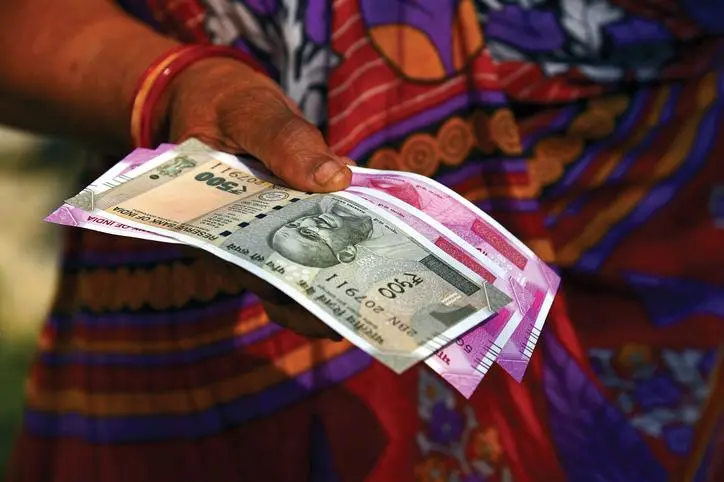PHOTO
The Indian rupee will remain under pressure and the government will allow the currency to depreciate further in the coming years to improve its competitiveness and increase exports as currencies of other emerging markets will also decline, say analysts.
Vijay Valecha, chief investment officer at Century Financial, predicted that the rupee will depreciate around 6.6 per cent next year to 75-76 versus dollar (20.4- 20.7 against dirham) and 84-85 (22.8-23.1) by 2023, which means it is not advisable for non-resident Indians to opt for fixed deposits.
"Each country is trying to reduce interest rates and increase liquidity and most importantly devaluing its currency to increase exports. Narendra Modi's government is also trying to boost exports as part of 'Make in India' campaign. That increases chances of India's currency war as well," he said.
"Given the Indonesian rupiah, Thai baht and Malaysian ringgit also falling, Reserve Bank of India will soon be forced to take action and reduce currency," he said while addressing The Institute of Chartered Accountants of India - Dubai chapter forum held in Dubai on Saturday.
Valecha said unemployment is going higher and increasing population worries for New Delhi. "We expect rupee at 75 to 76 versus dollar in 2020 and 84-85 by 2023. So any investment to be made in INR should be done taking into account the rupee's volatility," he added.
The rupee was trading at 71.36 versus US dollar and 19.44 against Emirati dirham.
Recently, India's rating has also been downgraded by Moody's and S&P.
Anish Mehta, chairman of ICAI's Dubai chapter, said in his opening address that investments are important also because in today's world, just earning money, probably, is not enough. "We all work hard for the money we earn. But to lead even a better lifestyle, we need to ensure that our money work hard for us as well."
Sunil Singhania, founder of Abakkus Asset Manager, also believes that rupee will depreciate but not as fast as witnessed previously because oil will remain low in the near future and that will put less pressure on the currency.
"For rupee, there has been structural changes for the better. One is India's inflation was always 5 to 7 per cent which has come down to 3.5 per cent to 4 per cent. Logically, with the lower inflation, rupee depreciation should be lower. Secondly, rupee is a dictated by oil prices because our biggest trade deficit item is oil. Fundamentally, oil looks weaker at $60 and below, hence, outlook for the rupee is that it will depreciate at much lower than historical average. It should not depreciate more than two per cent in five years every year," Singhania said on the sidelines of ICAI conference.
But, he said, if China also let its currency deprecate, then it becomes difficult for New Delhi but China has not done it for a long period of time in the past.
Sundar Nurani, vice-chairman of ICAI's Dubai chapter, said New Delhi's emphasis on several investment programmes is an indication that the economy is gradually phasing away from consumption-led to investment-led economy, which provides a frame.
Anurag Chaturvedi, managing partner at Chartered House Tax Consultancy, said Indian economy continues to be among the fastest growing major economies in the world as the markets are doing great in long run. "We have been witnessing recent reforms favoring the countries growth including a sharp cut in corporate taxes, in a bid to boost growth."
More Fed, RBI rates cuts
Sunil Singhania, founder of Abakkus Asset Manager, expects at least 50 basis point rate cut by the Reserve Bank of India over the next six months because inflation is under control and the government needs to kick start the economy and reducing interest rate should be one big weapon.
Vijay Valecha, chief investment officer of Century Financial, said the US Federal Reserve has been reducing rates this entire year and there has been three rate cuts so far this year. "Most of the world is expecting at least one rate cur this year and three more by next year end which will virtually bring down the interest rate to zero."
Copyright © 2019 Khaleej Times. All Rights Reserved. Provided by SyndiGate Media Inc. (Syndigate.info).





















